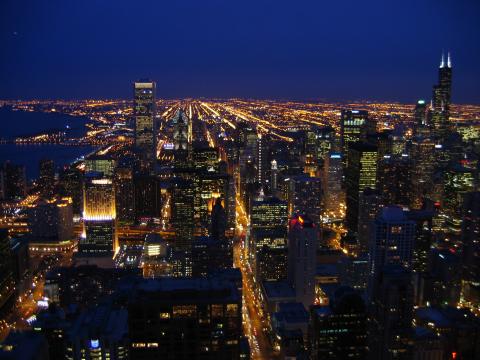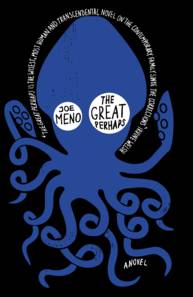Respect for complexity and diversity endorsed

“Astonishing and yet ordinary”. These are the words Joe Meno uses to describe Thisbe Casper’s music in The Great Perhaps. He could just as well say the same for family.
(Interview with Joe Meno on Politico here)
The Great Perhaps is an adventure told through the eyes and lives of the Caspers.
Jonathan, the father, is a palaeontologist searching for a prehistoric squid that he hopes will connect the dots in evolutionary theory, thereby answering the scientific meaning of life.
Madeline, the mother, is an animal behaviourist. She cannot explain why the pigeons she studies are becoming increasingly aggressive.
(Picture: the Chicago skyline, the city where the novel is set.)
Amelia, the eldest daughter, is a failed teenage revolutionary who wishes to show the world why they are dumb.
Thisbe, the youngest daughter, is a recent convert to Christianity, although she might also be lesbian.
Henry, Jonathan’s father, is obsessed with escaping from his retirement home and flying to Japan. He has decided to speak one word less every day until there are no words left and he can disappear.
Fear courses through the veins of each family member, particularly Jonathan. The novel is set in Chicago in the run up to the 2004 presidential election and Madeline, pained by the victory of Bush in the end, points out that the election was won through fear. “They tried to frighten people – with the war and terrorists and gay marriage – and it actually worked”.
Meno takes us through the history of the Casper antecedents and clearly fear runs down their bloodline like rainwater through soil. Different members of the Casper family are shown, always at times of war or empire building.
As George Casper, a geographer for the British East India Company in 1857, nears death “His heartbeat echoes with thousands of years of secret cowardice, running all the way back along the deformed branches of his blighted family tree, thousands of years of hidden weakness having finally produced this most misshapen, most frail of all human hearts”.
Back in 2004, Jonathan admits to being afraid “of almost everything”. He is obsessed with finding the squid that will give humanity the meaning of existence, but in reality, the only person to whom the (possibly extinct) squid gives meaning in life is Jonathan.
The squid certainly distracts him from his wife and a close relationship with her scares him the most. To open himself to someone, to let them into his darkest secrets, is the most terrifying thing of all.
The book sheds light on the limits of academic or scientific knowledge when compared with the emotional resonance of giving yourself over to someone.
Even though Amelia possesses many facts within her brain, mostly about the unfairness of capitalism, she becomes disconcerted by the fact that no one seems to realise how stupid they are for giving in to the capitalist myth. She stands at a Coke machine for a full school day and lectures anyone who comes near on the iniquities of the corporate machine. Nearly everyone ignores her and buys their can.
Madeline cannot explain why the temperate male birds have suddenly become aggressive. She comes to the conclusion, rather bewildered, that all animal societies need hierarchy. This disappoints her gravely.
“What does that mean for the world?”, she thinks to herself. “What does that mean for the rest of us who really don’t love the idea of being dominated? What if we really don’t want to be part of a dominant empire? What the hell do we do then?”
Uncertainty abates for Jonathan aswell. He cannot find the squid and Henry cannot speak.
Thisbe cannot prove the existence of God but she gives herself over to Him nonetheless, praying endlessly. And it is she who finally sets Henry free near the end: she is closer to the truth than the rest of her family.
Conciliation and restraint are urged as the unfolding plots of each family member emerge. Amelia forgives Mr Wick, her editor at the school newspaper, and stops her bomb from going off. Most of all, she forgives herself for failing to change capitalism all on her own.
Jonathan and Madeline need to forgive themselves first and then each other before they can reconcile.
Henry needs to forgive himself before he can allow himself to die. His longest speech suggests forgiveness is the highest act of bravery: “We always have to try to forgive the people we love. I think it’s the bravest thing we can do. When the time comes, I hope you will”.
Perhaps not astonishing, but certainly better than ordinary, The Great Perhaps is a highly enjoyable read which offers compelling reflections on America in the twenty first century and what it means to be a part of a family, which, in the book, means a respect for diversity and complexity.
 The Great Perhaps
The Great Perhaps
Picador
Hardback, pp415
€15.60
The Great Perhaps won the Great Lakes Book Award for Fiction 2009. This is the first time Joe Meno’s work has been published in Ireland and the UK.
